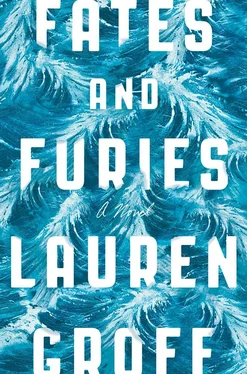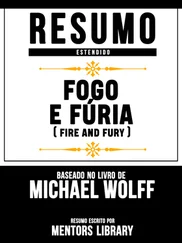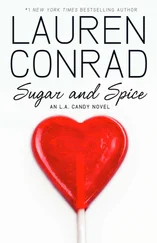“Ah, well. I’ve always been suspicious of self-congratulation,” Mathilde said. “We’ll celebrate properly when you hand me the personal stuff.”
“Celebrate? You and me and champagne and a suite at the St. Regis?” the investigator said, standing.
Mathilde looked at her strong bare legs, the narrow hips, her watchful face buried under all that blond. She smiled, felt the rusty mechanism of flirting begin to move. She’d never been with a woman. It would probably be softer, less muscular, like sexual yoga. It’d at least be novel. She said, “Maybe so. Depends on what you give me.”
The investigator gave a low whistle, and said, “Off to work I go.”
—
FOUR YEARS AFTER LOTTO DIED, when Mathilde was fifty, she bought a ticket to Paris.
Everything was so bright off the plane that she had to wear sunglasses. Even then, the brightness got in, bounced around her brain like a Spaldeen. Also, she wanted nobody to see how the smell of the place she was returning to ravaged her, made her eyes leak.
She had become tiny again here. In this language, she was again unable to be seen. She gathered herself at a café outside the gate. When the waiter in the airport brought her the espresso and pain au chocolat in a plastic pouch, he spoke to her in crisp French even though he turned and spoke uninflected English to the sophisticates at the table beside her. When it came time to pay, she didn’t understand this euro business. She searched her purse for francs.
In the grainy gray day, Paris overwhelmed her with the scents. Exhaust and piss and bread and pigeon shit and dust and shedding plane trees and wind.
The cabdriver, his nose besponged by pores, looked at her for a long while in the rearview mirror and asked her if she was all right. When she didn’t answer, he said soothingly, “You may cry here, cabbage. Cry as much as you wish. It is no hardship to watch a pretty woman cry.”
She showered and changed in the hotel, then rented a white Mercedes and drove out of the city. The roaring river of traffic comforted the American in her.
The roundabouts became tighter. The roads smaller. Eventually, they were dirt. There were cows, tractors, semi-abandoned villages of a sooty gray stone.
What had been so huge in her mind was, in fact, terribly small. The house’s stucco had been refreshed, painted white under the climbing ivy. The stones on the driveway were new, creamy, soft-edged gravel. The yews had grown, were neatly shaved across their tops like boys on the first day of school. The wine grapes in the back twined green as far as she could see, deep into her grandmother’s old cow fields.
A man a little younger than Mathilde was fixing a motorcycle’s wheel in the drive. He had a cycling jacket on and a swoop of gelled bangs cresting over his forehead. Mathilde recognized her own long fingers in his. Her own long neck. The same folded tip of the left ear.
“Papa,” she said aloud, but no, this man was far too young.
Into the bay window came a woman. Stout, bleary-eyed, elderly, though her hair was dyed a squid-ink black. She was wearing a thickness of eyeliner below her lower lids. She peered at Mathilde in the car and her puckered mouth moved, as if she were chewing something. The hand clutching the curtain was red, ragged, as if it had spent a lifetime among the cold guts of fish.
Mathilde remembered a cabinet full of ripening cheeses, the overwhelming smell. Blind at first, she drove away.
In the little village, the cathedral was embarrassing. A Romanesque pebble, when she remembered it grand, shocking, Gothic. The tabac sold eggs still crotted with chicken shit. It was barely noon and the boulangerie was closing. She went into a salon that was also a pizza takeout and the mairie .
When the mayor sat down and Mathilde told her what she wanted, the mayor blinked so furiously she left streaks of black mascara on the insides of her glasses. “But you are absolutely sure?” she said. “That house, well. It has been in their family for hundreds of years.”
“It is the only house in the world for me,” Mathilde said. The Breton accent came back easily to her tongue. Sturdy as heifers, as the rocks in the fields.
“It will cost you,” the mayor said. “They are very cheap, that family, very close with their money.” She puckered her mouth, made a rubbing motion with her fingertips close to her chest.
“I can see myself being happy there,” Mathilde said. “And only there. I long to come to this town in the summer. Maybe even open up a little antique shop with a tea place, draw the tourists.” The mayor’s face loosed with this. Mathilde pulled out the creamy card of her attorney and pushed it across the table. “Please conduct all business through this man. Of course, you’ll get a five percent commission.”
“Six,” said the mayor.
“Seven. I don’t care. Whatever it takes,” Mathilde said, and the mayor nodded, and Mathilde stood and in leaving said, “Do your magic.”
She returned to Paris feeling as if someone else were steering the car. It had been twenty-four hours since she’d last eaten when Mathilde sat down at her own table at La Closerie des Lilas. Not the best food in Paris. The most literary of restaurants, though. She’d dressed in a silver silk sheath, her hair back, her face flushed prettily.
When the waiter came over, Mathilde said only, “It has been a long time since I’ve been in France. I miss the food like a phantom limb.”
His brown eyes sparkled. His moustache gave a leap like a goosed mouse. “I shall bring you our best dishes,” he promised.
“And the wine to pair with them,” she said.
He feigned exasperation. “But of course,” he said. “Would I blaspheme?”
When he set the champagne before her, and the langoustine in its herbed mayonnaise, she said, “Thank you.” She ate, her eyes half closed.
All along, she’d known Lotto was with her, across the table, enjoying her food with her. He would have loved this night, her dress, the food, the wine. The lust welled in her until it was almost unbearable. If she looked up, she knew, she would see only an empty chair. She would not look up.
After the cheese, the waiter brought her a plate of tiny pastel marzipan fruit, and Mathilde smiled up at him. “À la victoire,” she said.
“À l’amour,” he said, twinkling.
She walked slowly back to her hotel over the cobblestones steaming from the swift summer storm that had passed lightly over the city while she ate. Her shadow paced beside her. She was able to make it to the bathroom, sitting calmly on the yellow travertine tub before she leaned over and vomited.
She flew home to the little white house in the cherry orchard. The purchase of the house in France took months. On the day the sale was finalized — for a fraction of what Mathilde would have paid, but, apparently, a great deal more than the house was worth — her lawyer sent her a bottle of Château d’Yquem.
She called him. “Excellent work, Klaus,” she said.
“Thank you, Mrs. Satterwhite,” he said. “They were… exigent.”
“Oh, but they’re exigent people,” she said lightly. “Sorry to say it, but I’m afraid I have more work for you.”
“Of course. That is why I am here,” he said.
“Now, if you please, have the house torn down. Roof to joists. The vines in the back ripped from the ground. All of it. I know it is ancient and against all sorts of laws, but do it so fast nobody has time to know what you’re doing. And do it as soon as possible.”
Only the slightest hesitation. She adored this discreet man. “As you wish,” he said. In the photographs he sent a week later, there was sky where there had been chimney, a clear view to the orchard where the four-hundred-year-old stone walls had been. The ground was a smoothly spread cloak of dirt.
Читать дальше












